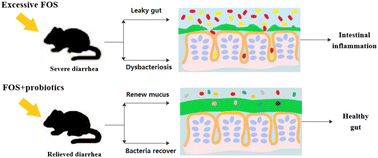Dysregulation of intestinal flora: excess prepackaged soluble fibers damage the mucus layer and induce intestinal inflammation†
Abstract
Soluble fiber is commonly used as a dietary supplement to improve intestinal flora, and many prepackaged products are sold in the market. However, whether these prepared soluble fibers are harmless for intestinal flora has not been systematically evaluated. Here, we assessed the dose–effect of fructooligosaccharides (FOSs) on obesity and intestinal flora using a mouse model. Gavage of low- and medium-dose FOS improved the microbiota in high-fat diet fed mice, but high-dose FOS leads to intestinal flatulence, diarrhea and flora disorders, including an increase in Akkermansia muciniphila and Clostridium difficile, which disrupt the mucus barrier and cause intestinal inflammation. Besides, a high dose of xylooligosaccharide by gavage induces symptoms similar to those of FOS in mice. These adverse effects can be alleviated by regulating intestinal flora. In addition, we experimentally proved that supplementary probiotics protect against the negative effects of FOS in obese mice. Therefore, prepackaged soluble fiber supplements need to be taken with caution, and excessive consumption of soluble fibers results in intestinal dysfunction and even induces intestinal inflammation. Combining probiotics and soluble fiber can be considered if necessary.



 Please wait while we load your content...
Please wait while we load your content...